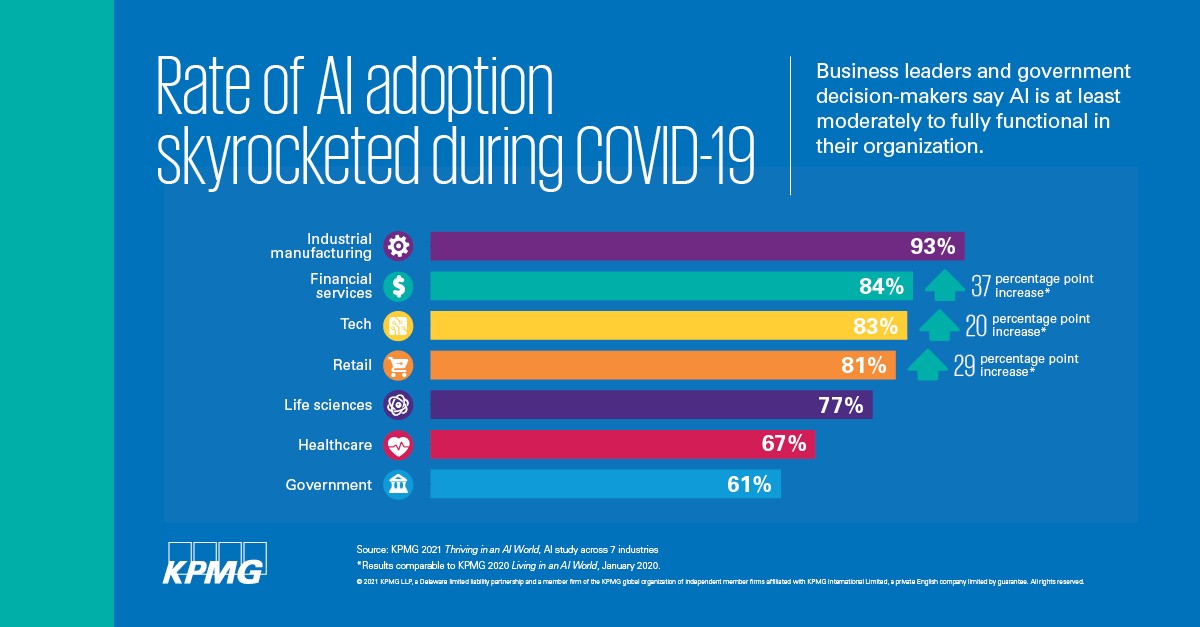Remember what happened to A.I. when the pandemic started almost exactly a year ago?
At first, we all noticed how A.I. models were suddenly off. Purchasing behavior and behavior overall became much less predictable and data scientists were needed to help steer A.I. during these times of uncertainty.
Then, with the lockdowns and curfews to help prevent the spread of COVID, we started to work from home. And with this the automation of processes that humans normally carried out was needed. More A.I. was needed. The question driving this need became: How can we build automated systems as quickly as possible and cover our loss in workers?
Now, looking back on the year since the lockdown, a lot has changed. Industries picked up A.I. and ran with it.
In this Tech Tuesday, far from a comprehensive “Year in A.I. Review”, I want to look at a new report from KPMG that shows the skyrocketing rate of A.I. adoption during COVID-19 and discuss what concerns emerge with such increased reliance on A.I.
KPMG Report Findings
When asked if their company had A.I. at least moderately functional in their organizations, industrial manufacturing lead the chart at 93%!
Financial services, tech, and retail are all in the mid to low 80 percentiles, while government was at the bottom of the survey at just 61% adoption.
The largest increases in adoption came from financial services (37 percent up) and retail (29 percent up).

Concerns About Ethics
With such fast-paced adoption comes at least one big question I address often: how is A.I. handling marginalized populations and ethics overall? A.I. capable of directing company patrons as well as companies themselves.
With fast adoption and little time for oversight, it’s good to see leaders like Traci Gusher show concern for how such fast growth of A.I. will affect company ethics. She says:
“… many say it’s [A.I.] moving too fast. That’s probably because of the current debate surrounding the ethics, governance, and regulation of A.I. Many business leaders do not have a view into what their organizations are doing to control and govern A.I. and may fear risks are developing.”
While leaders are concerned about its rapid growth, they’re confident that A.I. will continue to help them solve challenging industry problems – even challenges brought about by COVID-19. More than 80% said that A.I. helped them get through COVID-19.
This is good news! It means that rapid A.I. adoption worked. It means that there were generally enough practitioners available to implement what was needed, and remotely.
That said, with such a big spike in and reliance on A.I., it will be interesting to see if companies are able to keep their ethics in check as more and more processes are left up to non-human A.I. systems. Time will tell.
Read the full article here.
-Zank
Of Interest
Clearview A.I.’s Facial Recognition App Illegal in Canada
Facial recognition app Clearview A.I. is not welcome in Canada. Canadian authorities declared that the company needed citizens’ consent to use their biometric information, and told the firm to delete facial images from its database. “What Clearview does is mass surveillance, and it is illegal,” Commissioner Daniel Therrien said at a news conference. Read more here.
Why Deepfake Creators Love Tom CruiseA trio of viral videos allegedly depicting the actor Tom Cruise performing a magic trick, telling a not-so-funny joke, and practicing his golf swing are some of the most sophisticated examples yet seen of deepfakes, highly convincing fake videos created using A.I. technology, according to experts in the forensic analysis of digital images. But why do deepfake creators love Tom Cruise so much? Read about it here.
Announcing the 2021 A.I. Index Report
The 2021 A.I. Index report is one of the most comprehensive reports about artificial intelligence to date. This latest edition significantly expands the amount of data available in the report, which was drawn from a broader set of academic, private, and non-profit organizations for calibration. The report also shows the effect of COVID-19 on A.I. development from multiple perspectives, including how A.I. helps with COVID-related drug discovery and the effect of the pandemic on hiring and private investment.
